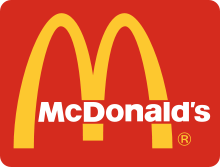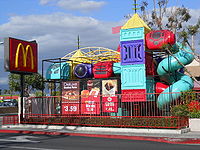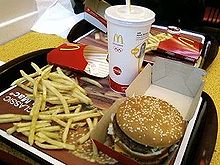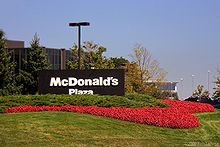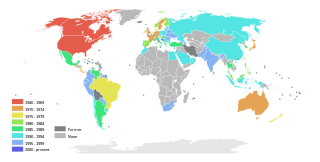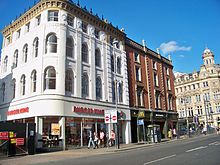- McDonald's
-
McDonald's 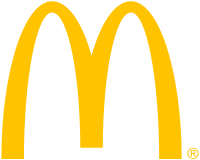
Type Public Traded as NYSE: MCD
Dow Jones Industrial Average ComponentIndustry Restaurants Founded May 15, 1940 in San Bernardino, California;
McDonald's Corporation, April 15, 1955 in Des Plaines, IllinoisFounder(s) Richard and Maurice McDonald McDonald's restaurant concept;
Ray Kroc, McDonald's Corporation founder.Headquarters Oak Brook, Illinois, U.S. Number of locations 33,000+ worldwide[1] Area served Worldwide Key people James A. Skinner
(Chairman & CEO)Products Fast food
(hamburgers • chicken • french fries • soft drinks • coffee • milkshakes • salads • desserts • breakfast)Revenue  US$ 24.075 billion (2010)[2]
US$ 24.075 billion (2010)[2]Operating income  US$ 7.473 billion (2010)[2]
US$ 7.473 billion (2010)[2]Net income  US$ 4.949 billion (2010)[2]
US$ 4.949 billion (2010)[2]Total assets  US$ 31.975 billion (2010)[2]
US$ 31.975 billion (2010)[2]Total equity  US$ 14.634 billion (2010)[2]
US$ 14.634 billion (2010)[2]Employees 400,000 (January 2010)[2] Website McDonalds.com
McDonald's Corporation (NYSE: MCD) is the world's largest chain of hamburger fast food restaurants, serving around 64 million customers daily in 119 countries.[3][4] Headquartered in the United States, the company began in 1940 as a barbecue restaurant operated by the eponymous Richard and Maurice McDonald; in 1948 they reorganized their business as a hamburger stand using production line principles. Businessman Ray Kroc joined the company as a franchise agent in 1955. He subsequently purchased the chain from the McDonald brothers and oversaw its worldwide growth. [5]
A McDonald's restaurant is operated by either a franchisee, an affiliate, or the corporation itself. The corporation's revenues come from the rent, royalties and fees paid by the franchisees, as well as sales in company-operated restaurants. McDonald's revenues grew 27 percent over the three years ending in 2007 to $22.8 billion, and 9 percent growth in operating income to $3.9 billion.[6]
McDonald's primarily sells hamburgers, cheeseburgers, chicken, french fries, breakfast items, soft drinks, shakes and desserts. In response to changing consumer tastes, the company has expanded its menu to include salads, wraps, smoothies and fruit.[7]
Contents
History
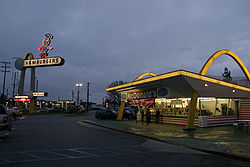 The oldest operating McDonald's restaurant is the third one built, in Downey, California, which opened in 1953.
The oldest operating McDonald's restaurant is the third one built, in Downey, California, which opened in 1953.
 Concept version of Ronald McDonald.
Concept version of Ronald McDonald. Main article: History of McDonald's
Main article: History of McDonald'sThe business began in 1940, with a restaurant opened by brothers Richard and Maurice McDonald in San Bernardino, California. Their introduction of the "Speedee Service System" in 1948 furthered the principles of the modern fast-food restaurant that the White Castle hamburger chain had already put into practice more than two decades earlier. The original mascot of McDonald's was a man with a chef's hat on top of a hamburger shaped head whose name was "Speedee." Speedee was eventually replaced with Ronald McDonald by 1967 when the company first filed a U.S. trademark on a clown shaped man having puffed out costume legs.
McDonald's first filed for a U.S. trademark on the name "McDonald's" on May 4, 1961, with the description "Drive-In Restaurant Services," which continues to be renewed through the end of December 2009. In the same year, on September 13, 1961, the company filed a logo trademark on an overlapping, double arched "M" symbol. The overlapping double arched "M" symbol logo was temporarily disfavored by September 6, 1962, when a trademark was filed for a single arch, shaped over many of the early McDonald's restaurants in the early years. Although the "Golden Arches" appeared in various forms, the present form as a letter "M" did not appear until November 18, 1968, when the company applied for a U.S. trademark.
The present corporation dates its founding to the opening of a franchised restaurant by Ray Kroc, in Des Plaines, Illinois, on April 15, 1955,[8] the ninth McDonald's restaurant overall. Kroc later purchased the McDonald brothers' equity in the company and led its worldwide expansion, and the company became listed on the public stock markets in 1965.[9] Kroc was also noted for aggressive business practices, compelling the McDonald brothers to leave the fast food industry. The McDonald brothers and Kroc feuded over control of the business, as documented in both Kroc's autobiography and in the McDonald brothers' autobiography. The site of the McDonald brothers' original restaurant is now a monument.[10]
With the expansion of McDonald's into many international markets, the company has become a symbol of globalization and the spread of the American way of life. Its prominence has also made it a frequent topic of public debates about obesity, corporate ethics and consumer responsibility.
Corporate overview
Facts and figures
 By 1993, McDonald's had sold more than 100 billion hamburgers. The once-ubiquitous restaurant signs that boasted the number of sales, such as this one in Harlem, were left at "99 billion" as there was only space for two digits.
By 1993, McDonald's had sold more than 100 billion hamburgers. The once-ubiquitous restaurant signs that boasted the number of sales, such as this one in Harlem, were left at "99 billion" as there was only space for two digits.
McDonald's restaurants are found in 119 countries[11] and territories around the world and serve 58 million customers each day.[3] McDonald's operates over 31,000 restaurants worldwide, employing more than 1.5 million people.[11] The company also operates other restaurant brands, such as Piles Café.
Focusing on its core brand, McDonald's began divesting itself of other chains it had acquired during the 1990s. The company owned a majority stake in Chipotle Mexican Grill until October 2006, when McDonald's fully divested from Chipotle through a stock exchange.[12][13] Until December 2003, it also owned Donatos Pizza. On August 27, 2007, McDonald's sold Boston Market to Sun Capital Partners.[14]
Types of restaurants
Most standalone McDonald's restaurants offer both counter service and drive-through service, with indoor and sometimes outdoor seating. Drive-Thru, Auto-Mac, Pay and Drive, or "McDrive" as it is known in many countries, often has separate stations for placing, paying for, and picking up orders, though the latter two steps are frequently combined; it was first introduced in Arizona in 1975, following the lead of other fast-food chains. The first such restaurant in Britain opened at Fallowfield, Manchester in 1986.[15]
In some countries, "McDrive" locations near highways offer no counter service or seating. In contrast, locations in high-density city neighborhoods often omit drive-through service. There are also a few locations, located mostly in downtown districts, that offer Walk-Thru service in place of Drive-Thru.
To accommodate the current trend for high quality coffee and the popularity of coffee shops in general, McDonald's introduced McCafé, a café-style accompaniment to McDonald's restaurants in the style of Starbucks. McCafé is a concept created by McDonald's Australia, starting with Melbourne in 1993. Today, most McDonald's in Australia have McCafés located within the existing McDonald's restaurant. In Tasmania, there are McCafés in every store, with the rest of the states quickly following suit. After upgrading to the new McCafé look and feel, some Australian stores have noticed up to a 60% increase in sales. As of the end of 2003 there were over 600 McCafés worldwide.
Some locations are connected to gas stations/convenience stores,[16] while others called McExpress have limited seating and/or menu or may be located in a shopping mall. Other McDonald's are located in Wal-Mart stores. McStop is a location targeted at truckers and travelers which may have services found at truck stops.[17]
Since 1997, the only Kosher McDonald's in the world that is not in Israel, is located in the "Abasto de Buenos Aires", Argentina.[18][19]
Playgrounds
McDonald's in Panorama City, Los Angeles, California designed for family-friendly image
Some McDonald's in suburban areas and certain cities feature large indoor or outdoor playgrounds. The first PlayPlace with the familiar crawl-tube design with ball pits and slides was introduced in 1987 in the USA, with many more being constructed soon after. Some PlayPlace playgrounds have been renovated into "R Gym" areas.
Redesign
 McDonald's in Exeter, UK. This is an example of the new look of McDonald's in Europe.
McDonald's in Exeter, UK. This is an example of the new look of McDonald's in Europe.
In 2006, McDonald's introduced its "Forever Young" brand by redesigning all of its restaurants, the first major redesign since the 1970s.[20][21]
The design includes the traditional McDonald's yellow and red colors, but the red is muted to terra cotta, the yellow was turned golden for a more "sunny" look, and olive and sage green were also added. To warm up its look, the restaurants have less plastic and more brick and wood, with modern hanging lights to produce a softer glow. Contemporary art or framed photographs hang on the walls.
Business model
McDonald's Corporation earns revenue as an investor in properties, a franchiser of restaurants, and an operator of restaurants. Approximately 15% of McDonald's restaurants are owned and operated by McDonald's Corporation directly. The remainder are operated by others through a variety of franchise agreements and joint ventures. The McDonald's Corporation's business model is slightly different from that of most other fast-food chains. In addition to ordinary franchise fees and marketing fees, which are calculated as a percentage of sales, McDonald's may also collect rent, which may also be calculated on the basis of sales. As a condition of many franchise agreements, which vary by contract, age, country, and location, the Corporation may own or lease the properties on which McDonald's franchises are located. In most, if not all cases, the franchisee does not own the location of its restaurants.
The UK business model is different than the US, in that fewer than 30% of restaurants are franchised, with the majority under the ownership of the company. McDonald's trains its franchisees and others at Hamburger University in Oak Brook, Illinois.
In other countries, McDonald's restaurants are operated by joint ventures of McDonald's Corporation and other, local entities or governments.
As a matter of policy, McDonald's does not make direct sales of food or materials to franchisees, instead organizing the supply of food and materials to restaurants through approved third party logistics operators.
According to Fast Food Nation by Eric Schlosser (2001), nearly one in eight workers in the U.S. have at some time been employed by McDonald's. (According to a news piece on Fox News this figure is one in ten.) The book also states that McDonald's is the largest private operator of playgrounds in the U.S., as well as the single largest purchaser of beef, pork, potatoes, and apples. The selection of meats McDonald's uses varies with the culture of the host country.[citation needed]
McDonald's has increased shareholder dividends for 25 consecutive years,[22] making it one of the S&P 500 Dividend Aristocrats.[23][24]
Controversies
As a prominent example of the rapid globalization of the American fast food industry, McDonald's is often the target of criticism for its menu, its expansion, and its business practices. The McLibel Trial, also known as McDonald's Restaurants v Morris & Steel, is an example of this criticism. In 1990, activists from a small group known as London Greenpeace (no connection to the international group Greenpeace) distributed leaflets entitled What's wrong with McDonald's?, criticizing its environmental, health, and labor record. The corporation wrote to the group demanding they desist and apologize, and, when two of the activists refused to back down, sued them for libel in one of the longest cases in British civil law. A documentary film of the McLibel Trial has been shown in several countries.
Despite the objections of McDonald's, the term "McJob" was added to Merriam-Webster's Collegiate Dictionary in 2003.[25] The term was defined as "a low-paying job that requires little skill and provides little opportunity for advancement".[26] In an open letter to Merriam-Webster, Jim Cantalupo, former CEO of McDonald's, denounced the definition as a "slap in the face" to all restaurant employees, and stated that "a more appropriate definition of a 'McJob' might be 'teaches responsibility.'" Merriam-Webster responded that "we stand by the accuracy and appropriateness of our definition."[27]
In 1999, French anti-globalisation activist José Bové vandalized a half-built McDonald's to protest against the introduction of fast food in the region.[28]
In 2001, Eric Schlosser's book Fast Food Nation included criticism of the business practices of McDonald's. Among the critiques were allegations that McDonald's (along with other companies within the fast food industry) uses its political influence to increase its profits at the expense of people's health and the social conditions of its workers. The book also brought into question McDonald's advertisement techniques in which it targets children. While the book did mention other fast-food chains, it focused primarily on McDonald's.
McDonald's is the world's largest distributor of toys, which it includes with kids meals.[29] It has been alleged that the use of popular toys encourages children to eat more McDonald's food, thereby contributing to many children's health problems, including a rise in obesity.[30]
In 2002, vegetarian groups, largely Hindu and Buddhist, successfully sued McDonald's for misrepresenting its French fries as vegetarian, when they contained beef broth.[31]
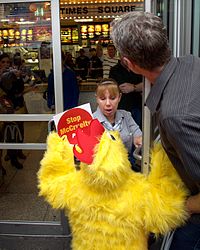 A PETA activist dressed as a chicken confronts the manager of the Times Square McDonald's over the company's animal welfare standards.
A PETA activist dressed as a chicken confronts the manager of the Times Square McDonald's over the company's animal welfare standards.
People for the Ethical Treatment of Animals (PETA), continues to pressure McDonald's to change its animal welfare standards, in particular the method its suppliers use of slaughtering chickens.[32] Most processors in the United States shackle fully conscious birds upside down and run them through an electrically charged water tub before slitting their throats.[33] PETA argues that using gas to kill the birds (a method called "controlled atmosphere killing: or CAK) is less cruel.[34] Both CAK and "controlled atmosphere stunning" (CAS) are commonly used in Europe.[35]
Morgan Spurlock's 2004 documentary film Super Size Me said that McDonald's food was contributing to the epidemic of obesity in society, and that the company was failing to provide nutritional information about its food for its customers. Six weeks after the film premiered, McDonald's announced that it was eliminating the super size option, and was creating the adult happy meal.
The soya that is fed to McDonald’s chickens is supplied by agricultural giant Cargill and comes directly from Brazil. Greenpeace alleges that not only is soya destroying the Amazon rain forest in Brazil, but soya farmers are guilty of further crimes including slavery and the invasion of indigenous peoples’ lands. The allegation is that McDonald's, as a client of Cargill's, is complicit in these activities.[36]
Arguments in defense
In response to public pressure, McDonald's has sought to include more healthy choices in its menu and has introduced a new slogan to its recruitment posters: "Not bad for a McJob".[37] (The word McJob, first attested in the mid-1980s[38] and later popularized by Canadian novelist Douglas Coupland in his book Generation X, has become a buzz word for low-paid, unskilled work with few prospects or benefits and little security.) McDonald's disputes this definition of McJob. In 2007, the company launched an advertising campaign with the slogan "Would you like a career with that?" on Irish television, outlining that its jobs have many prospects.
In an effort to respond to growing consumer awareness of food provenance, the fast-food chain changed its supplier of both coffee beans and milk. UK chief executive Steve Easterbrook said: "British consumers are increasingly interested in the quality, sourcing and ethics of the food and drink they buy".[citation needed] In a bid to tap into the ethical consumer market,[39] McDonald's switched to using coffee beans taken from stocks that are certified by the Rainforest Alliance, a conservation group that has been dubbed "Fairtrade lite."[40] Additionally, the company started using organic milk supplies for its hot drinks and milkshakes. According to a report published by Farmers Weekly in 2007, the quantity of milk used by McDonald's could have accounted for as much as 5% of the UK's organic milk output.[41]
McDonald's announced on May 22, 2008 that, in the U.S. and Canada, it would switch to using cooking oil that contains no trans fats for its french fries, and canola-based oil with corn and soy oils, for its baked items, pies and cookies, by year's end.[42][43]
With regard to acquiring chickens from suppliers who use CAK or CAS methods of slaughter, McDonald's says that it needs to see more research "to help determine whether any CAS system in current use is optimal from an animal welfare perspective."[44]
Environmental record
In April 2008, McDonald's announced that 11 of its Sheffield, England restaurants have been using a biomass trial that had cut its waste and carbon footprint by half in the area. In this trial, waste from the restaurants were collected by Veolia Environmental Services and used to produce energy at a power plant. McDonald's plans to expand this project, although the lack of biomass power plants in the U.S. will prevent this plan from becoming a national standard anytime soon.[45] In addition, in Europe, McDonald's has been recycling vegetable grease by converting it to fuel for its diesel trucks.[46]
Furthermore, McDonald's has been using a corn-based bioplastic to produce containers for some of its products. Although industries who use this product claim a carbon savings of 30% to 80%, a Guardian study shows otherwise. The results show that this type of plastic does not break down in landfills as efficiently as other conventional plastics. The extra energy it takes to recycle this plastic results in a higher output of greenhouse gases. Also, the plastics can contaminate waste streams, causing other recycled plastics to become unsaleable.[47]
The U.S. Environmental Protection Agency has recognized McDonald's continuous effort to reduce solid waste by designing more efficient packaging and by promoting the use of recycled-content materials.[48] McDonald's reports that it is committed towards environmental leadership by effectively managing electric energy, by conserving natural resources through recycling and reusing materials, and by addressing water management issues within the restaurant.[49]
In an effort to reduce energy usage by 25% in its restaurants, McDonald's opened a prototype restaurant in Chicago in 2009 with the intention of using the model in its other restaurants throughout the world. Building on past efforts, specifically a restaurant it opened in Sweden in 2000 that was the first to intentionally incorporate green ideas, McDonald's designed the Chicago site to save energy by incorporating old and new ideas such as managing storm water, using skylights for more natural lighting and installing some partitions and tabletops made from recycled goods.[50]
When McDonald’s received criticism for its environmental policies in the 1970s, it began to make substantial progress towards source reductions efforts.[51] For instance, an “average meal” in the 1970s—a Big Mac, fries, and a drink—required 46 grams of packaging; today, it requires only 25 grams, allowing a 46% reduction.[52] In addition, McDonald’s eliminated the need for intermediate containers for cola by having a delivery system that pumps syrup directly from the delivery truck into storage containers, saving two million pounds of packaging annually.[53] Overall, weight reductions in packaging and products, as well as the increased usage of bulk packaging ultimately decreased packaging by 24 million pounds annually.[54]
Legal cases
Main article: McDonald's legal casesMcDonald's has been involved in a number of lawsuits and other legal cases, most of which involved trademark disputes. The company has threatened many food businesses with legal action unless it drops the Mc or Mac from trading names. In one noteworthy case, McDonald's sued a Scottish café owner called McDonald, even though the business in question dated back over a century (Sheriff Court Glasgow and Strathkelvin, November 21, 1952). On September 8, 2009, McDonald's Malaysian operations lost a lawsuit to prevent another restaurant calling itself McCurry. McDonald's lost in an appeal to Malaysia's highest court, the Federal Court.[55]
It has also filed numerous defamation suits. For example, in the McLibel case, McDonald's sued two activists for distributing pamphlets attacking its environmental, labor and health records. After the longest trial in UK legal history, the judge found that some claims in the pamphlet were untrue and therefore libellous. The company, however, had asserted that all claims in the pamphlet were untrue, essentially obliging the judge to publicly rule on each one. Embarrassingly for the company, several of the specific allegations were upheld.[56]
McDonald's has defended itself in several cases involving workers' rights. In 2001 the company was fined £12,400 by British magistrates for illegally employing and over-working child labor in one of its London restaurants. This is thought to be one of the largest fines imposed on a company for breaking laws relating to child working conditions (R v 2002 EWCA Crim 1094). In April 2007 in Perth, Western Australia, McDonald's pleaded guilty to five charges relating to the employment of children under 15 in one of its outlets and was fined AU$8,000.[57]
Possibly the most infamous legal case involving McDonald's was the 1994 decision in The McDonald's Coffee Case where Stella Liebeck was awarded several million dollars after she suffered third-degree burns after spilling a scalding cup of McDonald's coffee on herself.
In a McDonald's American Idol figurine promotion, the figurine that represents "New Wave Nigel" wears something that closely resembles Devo’s Energy Dome, which was featured on the band's album cover, Freedom of Choice. In addition to the figurine's image, it also plays a tune that appears to be an altered version of Devo's song "Doctor Detroit." Devo copyrighted and trademarked the Energy Dome and is taking legal action against McDonald's.[58]
Products
Main article: McDonald's productsSee also: McDonald's products (international)McDonald's predominantly sells hamburgers, various types of chicken sandwiches and products, French fries, soft drinks, breakfast items, and desserts. In most markets, McDonald's offers salads and vegetarian items, wraps and other localized fare. On a seasonal basis, McDonald's offers the McRib sandwich. Some speculate the seasonality of the McRib adds to its appeal.[59]Portugal is the only country with McDonald's restaurants currently serving soup. This local deviation from the standard menu is a characteristic for which the chain is particularly known, and one which is employed either to abide by regional food taboos (such as the religious prohibition of beef consumption in India) or to make available foods with which the regional market is more familiar (such as the sale of McRice in Indonesia).
Headquarters
The McDonald's headquarters complex, McDonald's Plaza, is located in Oak Brook, Illinois. It sits on the site of the former headquarters and stabling area of Paul Butler, the founder of Oak Brook.[60] McDonald's moved into the Oak Brook facility from an office within the Chicago Loop in 1971.[61]
Advertising
Main article: McDonald's advertisingMcDonald's has for decades maintained an extensive advertising campaign. In addition to the usual media (television, radio, and newspaper), the company makes significant use of billboards and signage, sponsors sporting events ranging from Little League to the Olympic Games, and makes coolers of orange drink with its logo available for local events of all kinds. Nonetheless, television has always played a central role in the company's advertising strategy.
To date, McDonald's has used 23 different slogans in United States advertising[citation needed], as well as a few other slogans for select countries and regions. At times, it has run into trouble with its campaigns.
Children's advertising
Main articles: Ronald McDonald and McDonaldlandSports awards and honors
- See Category:McDonald's High School All-Americans
Global operations
 The McDonald's restaurant in Banbury's Bridge Street in 2010. It is still in white paint outside and blue/grey/brown inside as it was since 2002.
The McDonald's restaurant in Banbury's Bridge Street in 2010. It is still in white paint outside and blue/grey/brown inside as it was since 2002.
McDonald's has become emblematic of globalization, sometimes referred to as the "McDonaldization" of society. The Economist newspaper uses the "Big Mac Index": the comparison of a Big Mac's cost in various world currencies can be used to informally judge these currencies' purchasing power parity. Norway has the most expensive Big Mac in the world as of July 2011, while the country with the least expensive Big Mac is India (albeit for a Maharaja Mac—the next cheapest Big Mac is Hong Kong).[62]
Thomas Friedman once said that no country with a McDonald's had gone to war with another.[63][Full citation needed] However, the "Golden Arches Theory of Conflict Prevention" is not strictly true. Exceptions are the 1989 United States invasion of Panama, NATO's bombing of Serbia in 1999, the 2006 Lebanon War, and the 2008 South Ossetia war.
Some observers have suggested that the company should be given credit for increasing the standard of service in markets that it enters. A group of anthropologists in a study entitled Golden Arches East[64] looked at the impact McDonald's had on East Asia, and Hong Kong in particular. When it opened in Hong Kong in 1975, McDonald's was the first restaurant to consistently offer clean restrooms, driving customers to demand the same of other restaurants and institutions. McDonald's have recently[when?] taken to partnering up with Sinopec, the second largest oil company in the People's Republic of China, as it begins to take advantage of the country's growing use of personal vehicles by opening numerous drive-thru restaurants.[65] McDonald's has opened a McDonald's restaurant and McCafé on the underground premises of the French fine arts museum, the Louvre.[66]
McDonald's has started to offer free wireless Internet access in many countries.[67][68][69]
See also
- MaDonal, a restaurant knock-off operating in Northern Iraq .
- Maxime, McDuff & McDo, documentary film about the unionizing of a McDonald's in Montreal, Quebec, Canada.
- McHappy Day
Competitors
- Burger King—Second largest burger chain
- Wendy's—World's third largest hamburger fast food chain
- Jack in the Box—American fast food chain
- Subway—Largest single-brand restaurant chain
- Carl's Jr.—Fifth largest American fast food chain
- Five Guys—American fast food chain
- Whataburger—American fast food chain
- Krystal—American fast food chain
- White Castle—American fast food chain
- Yum!—Largest multi-brand restaurant chain
References
- ^ McDonald's publication. "Corporate FAQ". McDonald's Corporation. http://www.mcdonalds.ca/en/aboutus/faq.aspx. Retrieved 2007-11-24.
- ^ a b c d e f "2010 Form 10-K, McDonald's Corporation". United States Securities and Exchange Commission. http://www.sec.gov/Archives/edgar/data/63908/000119312511046701/d10k.htm. Retrieved 2011-03-03.
- ^ a b "McDonald's Corporation 2010 Annual Report". McDonald's Corporation. 2010. http://www.aboutmcdonalds.com/etc/medialib/aboutMcDonalds/investor_relations3.Par.56096.File.dat/2010%20Annual%20Report%20(print).pdf. Retrieved 2011-07-12.
- ^ "50th Anniversary of McDonald's". NPR. 2005-4-14. http://www.npr.org/templates/story/story.php?storyId=4600471.
- ^ "McDonald's History". Aboutmcdonalds.com. http://www.aboutmcdonalds.com/mcd/our_company/mcd_history.html. Retrieved 2011-07-23.
- ^ "MCD 10-K 2007, Item 6, pg. 9". http://www.shareholder.com/mcd/EdgarDetail.cfm?CIK=63908&FID=1193125-08-37220&SID=08-00#D10K_HTM_TOC84398_8.[dead link]
- ^ Stephen Evans (20 April 2004). "McDonald's: The journey to health". BBC News. http://news.bbc.co.uk/2/hi/business/3641603.stm. Retrieved 2 May 2011.
- ^ "McDonald's history 1954–1955". www.mcdonalds.com. http://www.mcdonalds.com/corp/about/mcd_history_pg1.html. Retrieved 2008-06-22.[dead link]
- ^ "McDonald's history 1965–1973". www.mcdonalds.com. http://www.mcdonalds.com/corp/about/mcd_history_pg1/mcd_history_pg3.html. Retrieved 2008-06-22.[dead link]
- ^ McDonaold's history from Route-66.com[dead link]
- ^ a b Mcdonalds.ca, retrieved May 8, 2008
- ^ Brand, Rachel. (2006-12-23) "Chipotle founder had big dreams"[dead link] Rocky Mountain News. retrieved on 2009-10-07.
- ^ "McDonald's sets October deadline to sell Chipotle stock". Denver Business Journal (BizJournals.com). July 25, 2006. http://denver.bizjournals.com/denver/stories/2006/07/24/daily20.html. Retrieved 2009-08-10.
- ^ "McDonald's Wraps Up Boston Market Sale". Dow Jones & Company, Inc. News Services. 2007-08-27. Archived from the original on 2007-09-28. http://web.archive.org/web/20070928010947/http://www.smartmoney.com/bn/ON/index.cfm?story=ON-20070827-000332-1731&hpadref=1. Retrieved 2007-08-28.
- ^ "McDonald's Restaurants". Caterersearch.com. http://www.caterersearch.com/Companies/33902/mcdonalds-restaurants-ltd.html. Retrieved 2011-07-23.
- ^ "McDonald's and BP test combined operations. (McDonald's Restaurants; BP Oil Co.)". http://www.highbeam.com/doc/1G1-14996359.html.
- ^ "McDonald's serves up 'MCSTOP' – Its restaurant for big crowds". http://nl.newsbank.com/nl-search/we/Archives?p_product=MH&s_site=miami&p_multi=MH&p_theme=realcities&p_action=search&p_maxdocs=200&p_topdoc=1&p_text_direct-0=0EB3604178F30F7B&p_field_direct-0=document_id&p_perpage=10&p_sort=YMD_date:D&s_trackval=GooglePM.
- ^ "El único Mc Donald’s kosher del mundo fuera de Israel es certificado por Ajdut Kosher" (Spanish and English). Last consulted: 22/05/2011
- ^ "Buenos Aires Restaurants - Kosher McDonald's". Travel.nytimes.com. http://travel.nytimes.com/travel/guides/central-and-south-america/argentina/buenos-aires/restaurant-detail.html?vid=1154654647274. Retrieved 2011-07-23.
- ^ "McDonald's wants a digital-age makeover". http://moneycentral.msn.com/content/invest/extra/P150732.asp?GT1=8180.
- ^ "Mickey D's McMakeover". http://www.businessweek.com/magazine/content/06_20/b3984065.htm.
- ^ Baertlein, Lisa (September 24, 2009). "McDonald's raises cash dividend by 10%". reuters.com. http://www.reuters.com/article/rbssConsumerGoodsAndRetailNews/idUSN2447000720090924. Retrieved 2010-08-27.
- ^ "Definition of S&P 500 Aristocrat at Investopedia". Investopedia.com. http://www.investopedia.com/terms/s/sp-dividend-aristocrats.asp. Retrieved 2010-08-27.
- ^ "List of 2009 Dividend Aristocrats via Seeking Alpha, retrieved 10/1/2009". Seekingalpha.com. 2008-12-23. http://seekingalpha.com/article/111974-s-p-s-2009-dividend-aristocrats-who-made-the-cut. Retrieved 2010-08-27.
- ^ "CNN.com – Merriam-Webster: 'McJob' is here to stay – Nov. 11, 2003". http://www.cnn.com/2003/SHOWBIZ/books/11/11/offbeat.mcjob.ap/.[dead link]
- ^ "McJob". Merriam-Webster's Online Dictionary. 1986. http://www.merriam-webster.com/dictionary/mcjob. Retrieved 2009-11-29.
- ^ AFP (November 12, 2003). "McDonald's upset over McJob title". http://www.abc.net.au/news/newsitems/200311/s987302.htm. Retrieved October 18, 2009.[dead link]
- ^ "José Bové". BBC. http://www.bbc.co.uk/bbcfour/documentaries/profile/jose_bove.shtml. Retrieved 2008-05-29. "In 1999, Bove spent another three weeks in jail after he led activists in the destruction of—guess what—a branch of McDonald's. For Bove, the golden arches represent the industrialization of all food production, the worst of 'malbouffe—bad food'. For the anti-global movement, his imprisonment made him one of its first martyrs."
- ^ Smith, Andrew F. (2007). The Oxford companion to American food and drink. Oxford University Press US. p. 371. ISBN 9780195307962.
- ^ Katz, Neil (2010-06-23). "McDonald's and Toy Lawsuit: Are "Happy Meals" Tricking Kids?". CBS News. http://www.cbsnews.com/8301-504763_162-20008571-10391704.html. Retrieved 2010-09-14.
- ^ "Letter from McDonald's headquarters claiming fries are vegetarian". http://hbharti.com/h_bharti_mcd/mcdonlads%20_letter_05_05_93.jpg.
- ^ David Sterrett, "McDonald’s Being Ambushed by PETA," ChicagoBusiness.com 11 Feb. 2010.
- ^ Katherine Glover, "PETA vs. McDonald's: Nicest Way to Kill a Chicken[dead link]," BNET 20 Feb. 2009.
- ^ PETA, "McCruelty, I'm Hatin' It," McCruelty.com[dead link], last accessed 14 Nov. 2010.
- ^ Glover.
- ^ Greenpeace International (April 2006). "We're trashin'it, How McDonald's is eating up the Amazon" (PDF). http://www.greenpeace.org.uk/media/reports/were-trashin-it. Retrieved 2008-12-15.
- ^ Sweney, Mark (2006-04-20). "Not bad for a McJob?". London: The Guardian. http://www.guardian.co.uk/media/organgrinder/2006/apr/20/post3. Retrieved 2009-03-30.
- ^ Merriam-Webster: 'McJob' is here to stay[dead link]
- ^ Carrigan, Marylyn and De Pelsmacker, Patrick (2009). Will ethical consumers sustain their values in the global credit crunch? International Marketing Review, 26(6), pp. 674–687,(p.7).
- ^ Manchester Evening News (2007). McDonald's brew a forest-friendly coffee. URL accessed on January 20, 2007.
- ^ Ian Ashbridge (2007-07-03). "McDonald's milk goes organic – 03/07/2007 – FarmersWeekly". Fwi.co.uk. http://www.fwi.co.uk/Articles/2007/07/03/104864/mcdonalds-milk-goes-organic.html. Retrieved 2010-08-27.
- ^ "McDonald's Holds down Dollar Meal, Making Menu Healthier". International Business Times. 2008-05-22. http://www.ibtimes.com/articles/20080522/mcdonald-039-holds-down-dollar-meal-making-menu-healthier.htm. Retrieved 2011-07-23.
- ^ "McDonald's says all US French fries cooked in zero-trans-fat oil". www.gmanews. http://www.gmanews.tv/story/96850/McDonalds-says-all-US-french-fries-cooked-in-zero-trans-fat-oil.
- ^ "Report of the Corporate Responsibility Committee of the Board of Directors of McDonald’s Corporation" (PDF). 19 November 2009. http://www.aboutmcdonalds.com/etc/medialib/aboutMcDonalds/corporate_governance.Par.47812.File.dat/CAS_REPORT_2009.pdf. Retrieved 2011-07-23.
- ^ ""McDonald's hails success of waste-to-energy trial"". Businessgreen.com. http://www.businessgreen.com/business-green/news/2214193/mcdonald-hails-success-waste. Retrieved 2011-07-23.
- ^ ""Local woman creates environmental-friendly Web site"". Herald-dispatch.com. 2008-04-19. http://www.herald-dispatch.com/business/x1705909477. Retrieved 2011-07-23.
- ^ John Vidal, environment editor (2008-04-26). ""'Sustainable' bio-plastic can damage the environment"". London: Guardian. http://www.guardian.co.uk/environment/2008/apr/26/waste.pollution. Retrieved 2011-07-23.
- ^ "U.S. Environmental Protection Agency". http://www.epa.gov/wastewise/industry/id-food.htm. Retrieved April 17, 2008.
- ^ "McDonald's Corporation website". http://www.mcdonalds.com/corp/values/place/environment.html. Retrieved April 17, 2008.[dead link]
- ^ Goodman, Matthew (April 5, 2009). Big Mac, hold the CO2. The Sunday Times. http://business.timesonline.co.uk/tol/business/industry_sectors/retailing/article6035749.ece.
- ^ "National Pollution Prevention Center for Higher Education" (PDF). http://www.umich.edu/~nppcpub/resources/compendia/CORPpdfs/CORPcaseA.pdf.
- ^ Environmental Defense Fund. Task Force Report. p. 42.
- ^ Environmental Defense Fund and McDonald's Corporation. Waste Reduction Task Force Final Report. Oak Brook, IL: McDonald's, 1991. p. 22.
- ^ [McDonald’s "Corporation. McDonald's Packaging — The Facts. Oak Brook, IL: McDonald’s, 1990. p. 7."]. McDonald’s.
- ^ BBC online news article dated September 8, 2009 News.BB.co.uk
- ^ Mark Oliver (2005-02-15). "Q&A: the McLibel case". London: Guardian. http://www.guardian.co.uk/news/2005/feb/15/food.foodanddrink. Retrieved 2011-07-23.
- ^ "McDonald's fined for employing underage workers". ABC News Online. 2007-04-12. http://www.abc.net.au/news/newsitems/200704/s1895071.htm. Retrieved 2007-04-12.[dead link]
- ^ Caro, Mark (2008-06-26). "Devo looks to whip McDonald's good". Chicago Tribune. http://featuresblogs.chicagotribune.com/entertainment_popmachine/2008/06/devo-looks-to-w.html. Retrieved 2008-06-27.
- ^ "Fanatics Preach Fast Food Evangelism". Fox News. 2011-07-23. http://latino.foxnews.com/latino/health/2011/07/23/fanatics-preach-fast-food-evangelism/.
- ^ Steele, Jeffrey. "Oak Brook history in caring hands society president is part of village's changing heritage." Chicago Tribune. July 29, 1998. Page 88. Retrieved on September 17, 2009.
- ^ Cross, Robert. "Inside Hamburger Central." Chicago Tribune. January 9, 1972. G18. Retrieved on September 17, 2009.
- ^ "The Big Mac index – Currency comparisons, to go". The Economist. July 28, 2011. http://www.economist.com/blogs/dailychart/2011/07/big-mac-index. Retrieved July 28, 2011.
- ^ ""The Lexus and the Olive Tree"". Thomaslfriedman.com. http://www.thomaslfriedman.com/lexusolivetree.htm. Retrieved 2011-07-23.
- ^ Stanford University Press, 1998, edited by James L. Watson
- ^ "McDonald's deal with oil company marries China's new love of fast food, cars". http://www.canada.com/topics/finance/story.html?id=e4cdb03e-6e89-4df4-a38b-187283fdeab3&k=65519.
- ^ Samuel, Henry (October 4, 2009). "McDonald's restaurants to open at the Louvre". Telegraph.co.uk (London). http://www.telegraph.co.uk/news/worldnews/europe/france/6259044/McDonalds-restaurants-to-open-at-the-Louvre.html.
- ^ [1]
- ^ [2]
- ^ [3]
Further reading
- Thomas Derdak and Jay P. Pederson, ed (2004). "McDonald's". International directory of company histories. 67 (3rd ed.). St. James Press. pp. 108–109. ISBN 1558625127.
- Love, John F. (April 1987). "Big Macs, Fries, and Real Estate". Financial Executive (4): 20–26.
External links
- McDonald's
- "Big Mac's Makeover: McDonald's Turned Around". The Economist. 2004-10-14. http://www.economist.com/business/displaystory.cfm?story_id=E1_PNRVRJR.
- News
- CBC Archives—CBC Television reports on the opening of Moscow McDonald's (1990)
McDonald's People Richard and Maurice McDonald · Ray Kroc · Joan Kroc · Ralph Alvarez · Charlie Bell · Jim Cantalupo · George Cohon · Don Gorske · Jack M. Greenberg · Jim Skinner · Donald N. Smith · Fred L. Turner · Michael R. Quinlan · Al Bernardin · Herb Peterson · Willard ScottCompany Products BeefChickenOtherAdvertising CampaignsSponsorshipsRelated subjectsBurger Wars · Fast food advertisingOtherFranchises Criticism Legal cases Other Annual revenue US$24.075 billion (2010) · Employees 400,000 (2010) · Stock symbol NYSE: MCD · Website mcdonalds.com
US$24.075 billion (2010) · Employees 400,000 (2010) · Stock symbol NYSE: MCD · Website mcdonalds.comComponents of the Dow Jones Industrial Average Current 3M · Alcoa · American Express · AT&T · Bank of America · Boeing · Caterpillar · Chevron · Cisco Systems · The Coca-Cola Company · DuPont · ExxonMobil · General Electric · Hewlett-Packard · The Home Depot · Intel · IBM · Johnson & Johnson · JPMorgan Chase · Kraft Foods · McDonald's · Merck & Co. · Microsoft · Pfizer · Procter & Gamble · The Travelers Companies · United Technologies Corporation · Verizon Communications · Walmart · The Walt Disney CompanySelected former Altria Group · American International Group · American Tobacco Company · Bethlehem Steel · Citigroup · Colorado Fuel and Iron · Kodak · General Foods · General Motors · Goodyear Tire and Rubber Company · Honeywell · International Harvester · International Paper · Johns Manville · Nash Motors · Navistar International · North American Company · Owens-Illinois · Sears, Roebuck and Company · Union Carbide · United States Rubber Company · U.S. Steel · F. W. Woolworth CompanyFood chains in the United Kingdom Coffeehouses: Fast food restaurants: Baskin-Robbins · Ben & Jerry's · Burger King · Chicken Cottage · Chipotle Mexican Grill · Dixy Chicken · Domino's Pizza · EasyPizza · Favorite Chicken · KFC · Krispy Kreme · Little Chef · McDonald's · Millie's Cookies · Oporto · Papa John's Pizza · Shakeaway · Southern Fried Chicken ( Fast food shop) · Spudulike · Taco Bell · The West Cornwall Pasty Company · Wimpy · Yogen FrüzCasual dining: Aberdeen Angus Steak Houses · Ask · Beefeater · Bella Italia · Brewers Fayre · Cadbury Cocoa House · Café Rouge · Carluccio's · Chiquito · Damon's · Fine Burger Company · Frankie & Benny's · Giraffe · Gourmet Burger Kitchen · Hard Rock Cafe · Harry Ramsden's · Harvester · Hooters · Hungry Horse · Loch Fyne Restaurants · Nando's · OK Diner · Outback Steakhouse · PizzaExpress · Pizza Hut · Planet Hollywood · Prezzo · Rainforest Cafe · Romano's Macaroni Grill · Ruby Tuesday · Strada · Table Table · Taybarns · T.G.I. Friday's · Wagamama · YO! Sushi · ZizziSandwich shops: Bagel Nash · Cooks the Bakery · EAT. · Greggs · O'Briens · Pret A Manger · Quiznos · Sayers · Subway · Tastte! · Upper CrustPub chains: Former chains: ABC · Arby's · A&W Restaurants · Bakers Oven · Beard Papa's · Benjys · Berni Inn · Blimpie · Chili's · Dunkin' Donuts · Firkin Brewery · Gloria Jean's Coffees · Happy Eater · Long John Silver's · Lyons Corner Houses · Pizzaland · Popeyes Chicken & Biscuits · Quick · Schlotzsky's · Wendy'sIllinois-based corporations Fortune 500
corporations
(by size–2010)Archer Daniels Midland · Boeing · Walgreen · State Farm Insurance Cos. · Sears Holdings Corporation · Kraft Foods · Caterpillar Inc. · Allstate · Abbott Laboratories · Deere & Company · McDonald's · Motorola · Exelon · United Continental Holdings · Illinois Tool Works · Sara Lee Corporation · Baxter International · Navistar International · RR Donnelley · Discover Financial · Aon Corporation · Integrys Energy Group · OfficeMax · W. W. Grainger · Fortune Brands · Smurfit-Stone Container · Telephone and Data Systems · Anixter · United Stationers · Tenneco · Northern TrustFortune 1000
corporations
(by size–2010)Companies listed above, plus: Hospira · Old Republic International · Nalco Holding Company · Corn Products International · Pactiv · Hyatt Hotels Corp. · Country Financial · General Growth Properties · Hewitt Associates · Unitrin · Nicor · CME Group · CF Industries Holdings · Molex · Jones Lang LaSalle · Packaging Corp. of America · Brookdale Senior Living · Equity Residential · Career Education Corporation · AptarGroup · True Value · Gardner Denver · Arthur J. Gallagher & Co.Other major private and
public companies
(alphabetically)Ace Hardware · ACCO Brands · Amsted Industries · Baker & McKenzie · Blue Cross Blue Shield Association · CDW · CNA Financial · Dot Foods · Eby-Brown · Electro-Motive Diesel · Flex-N-Gate · Follett Corporation · Grant Thornton LLP · Health Care Service Corporation · Heico Cos. · Hendrickson International · Jenner & Block · JPMorgan Chase Bank · Kirkland & Ellis · Koch Foods · Marmon Group · Mayer Brown · Medline Industries · OSI Group · Reyes Holdings · Sauer-Danfoss · Schiff Hardin LLP · Sidley Austin · Skidmore, Owings and Merrill · Solo Cup Company · Tellabs · Tribune Company · U.S. Foodservice · Walsh Group · Wirtz Corp.Categories:- Companies listed on the New York Stock Exchange
- McDonald's
- Companies based in DuPage County, Illinois
- Restaurants established in 1940
- Dow Jones Industrial Average
- Fast-food chains of the United States
- Fast-food franchises
- Fast-food hamburger restaurants
- Globalization
- Multinational food companies
- Oak Brook, Illinois
- Restaurant chains in the United States
- Worldwide Olympic sponsors
Wikimedia Foundation. 2010.


